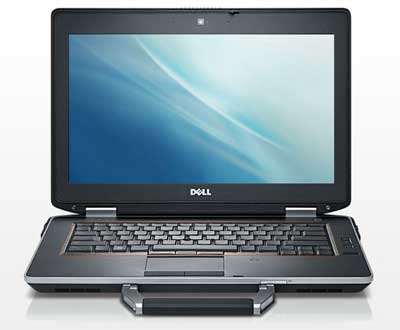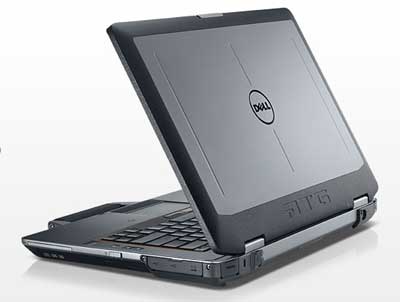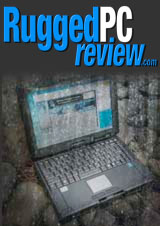When affixed to a Dell notebook, the letters "ATG" stand for "All Terrain Grade" and at Dell that means semi-rugged. The Dell Latitude E6420 ATG discussed on this page was introduced in June of 2011 as a tech upgrade to the prior E6400 ATG. This latest fortified laptop model means Dell has something to offer to customers who want a computer that can handle more abuse than run-of-the-mill consumer notebooks, but without the cost of the full rugged treatment as in Dell's own E6420 XFR. The ATG costs about twice as much as a standard issue Latitude, but only half as much as the big, bad XFR.

It's always good to know how things came about, and here's the ATG's history. Around 2007 Dell realized there was a small but growing market for tougher versions of standard notebooks. The original Latitude ATG (see our 2007 review) was a half-hearted effort and quickly replaced with the ATG D630 that introduced a superb outdoor-viewable display technology called DirectVue (we were impressed; see our full review of the ATG 630). Since Dell consumer notebook product cycles are fairly short and the ATG models are based on them, the D630 gave way to the E6400 ATG, and that one to the new E6420 ATG.
So what differentiates the ATG model from a regular Latitude 6420, and what makes it "all terrain grade?" While Dell doesn't publish ruggedness benchmarks in its specifications, the ATG is third-party tested and certified for durability and reliability according to the MIL-STD 810G test procedures for a variety of harsh environment conditions. However, unlike fully-rugged notebooks that are designed to survive brutal punishment, the emphasis here is on immunity to more minor mishaps that can be addressed with a spill-resistant keyboard, port covers, shock-mounted hard drive and LCD, and a sturdy magnesium base.
The fortifications do add some weight. While the consumer version weighs just 4.5 pounds, the beefed-up ATG starts at about 6 pounds. It has a foot print of 14.0 x 9.7 inches and its wedge profile is 1.1 to 1.5 inches thick. The system has a 14.0-inch 1366 x 768 wide-format display that uses what Dell calls a "Wide View" anti-glare outdoor viewable display (as opposed to the "DirectVue" display enhancements that come with the fully rugged XFR model). A resistive touch screen is available as a US$125 option.

The E6420 ATG can be equipped with either a 2.5GHz Intel Core i5-2520M (3.2GHz with turbo boost), a 2.5GHz Intel Core i5-2540M (3.3GHz with turbo boost), or a 2.8GHz Core i7-2640M (3.5GHz with turbo boost) processor and with up to 8GB of 1333MHz DDR3 RAM. A 250GB 5400rpm hard drive comes standard, with encrypted disks and disks up to 750GB available. A 256GB SSD is optionally available for $580 extra. You can also get a second hard disk for the system's media bay.
Like the competition in this class, the E6420 ATG offers very good connectivity and expandability. There are four USB 2.0 ports, a USB/eSATA combo port, an RJ45 LAN jack, audio in/out, VGA and HDMI video, and a docking connector, all with protective covers. There is a memory card reader and an Expresscard/54 slot. There is also the modular E6420-Family media bay can accommodate all sorts of optical drives, a second hard disk, the secondary battery, USB 3.0, or extra ports.
On the communication side, there are various types of Dell or Intel WiFi half mini cards, an optional Bluetooth 3.0 module, optional SiRFstarIV GPS, and optional WWAN including Gobi 3000. For security, there is optional Dell Data Protection and Encryption software. Add the optional Hardware Encryption Accelerator for full volume encryption and FIPS 140-2, Level 3 compliance.
How tough and rugged is the E6420 ATG? Considerably more so than a standard notebook. Drops from a desk or coffee spilled onto the keyboard won't faze the ATG whereas they can kill a lesser laptop. That said, "semi-rugged" means only IP5x sealing (protected against dust) instead of the IP65 rating (fully protected against dust and also to water spray from all over) of the XFR. Dell mentions additional MIL-STD-810G tests, but doesn't offer specifics. Somewhat disconcertingly, Dell offers "Accidental Damage Service" to "protect your system from drops, spills and other uh-ohs" as an extra cost item. Didn't customers pay for that extra protection by spending twice as much for an ATG model instead of a regular Latitude?
This lack of specifics brings up the matter of Dell's fondness of marketing speak instead of straight information about the materials and methods used to make the machine tougher. So the product description is full of prose like "stylishly armored MIL-STD 810G-tested Tri-Metal design", "ExpressCharge" batteries, "StrikeZone" and "ControlVault" data protection, "ImageWatch" previews, or "KACE easy to use system management appliances." Straight talk, please.
That's all a bit unfortunate as the Dell E6420 ATG is a competent, flexible semi-rugged laptop that offers extra peace of mind and likely a lower overall cost of ownership in the long run. It is a serious alternative to the semi-rugged offerings from the traditional rugged computer manufacturers. Those still have more experience in rugged and semi-rugged equipment than Dell, but there are enterprise customers who would rather get all their gear from the same vendor and appreciate Dell's quick access to all the latest technology (though even for Dell it's difficult to keep up: the ATG could definitely benefit from Intel's 3rd gen Core processors).
The price, however, is a bit high. A base E6420 XFR starts at $2,270 (though when we checked in June of 2012, Dell offered it at US$1,949) with 2GB of RAM and a 250GB hard disk, but a better-optioned one with the faster i7 processor, 4GB of RAM, GPS, the touch screen, Bluetooth, and the high capacity battery quickly gets over US$3,000. That's quite a bit for a machine based on a high-volume consumer notebook that costs well under a grand, but that's what the competition charges, too.
The big selling point here is that these semi-rugged ATG machines are Dells, and as such they fit right into existing IT infrastructures of Dell notebooks in all sorts of organizations.



